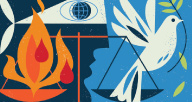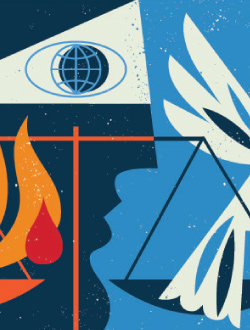“The role of 21C international criminal justice…

Benjamin B. Ferencz
…is central. As a combat soldier and war crimes investigator during WW2, I am well acquainted with the horrors of war. I dug up bodies of murdered American fliers with my bare hands, and was there at the liberation of concentration camps used for the systematic murder of countless men, women and children whose only offence was that they happened not to share the race, creed or ideology of their executioners.
Later, I served at Nuremberg as Chief Prosecutor in the Einsatzgruppen case, billed in the press at the time as “The Biggest Murder Trial in History.” All 22 of the defendants charged were convicted for their role in the ruthless killing of over a million Jews, Roma, communists, and other perceived enemies of the Third Reich.
Today, we have an active, though still nascent, permanent International Criminal Court (ICC). I was privileged to join its prosecution team in making the closing statements in its first case – that of Thomas Lubanga Dyilo – in 2011. I stated then, and reiterate now, that the Court reflects a critical step in “the slow awakening of the human conscience.”
At Nuremberg, I opened my case by saying that “the case we present is a plea of humanity to law.” Today, the tables are turned: the Rome Statute of the ICC – currently with over 120 adherents – represents a plea of law to humanity. It is a treaty that calls out to the nations and the peoples of the world for ratification and implementation. Like a child in its infancy, it needs the cooperation of states to grow into the tool of accountability and deterrence that it was meant to be.
It is axiomatic that failure to enforce law undermines law itself. The original UN Charter plan for comprehensive disarmament and an independent military force was never given a chance. In desperation, those who fear that their cherished values are threatened strike back with whatever tools of terror they have. As long as militants – whether individuals, groups or nations – insist that they alone can determine the legality of their actions, their military power is not a safeguard, but a menace. The illegal use of armed force – the biggest atrocity of all – is a crime against humanity. Conflict and mass violence can only be curbed rationally by peaceful means.
Similarly, unauthorized humanitarian interventions may be morally legitimate, but it is not up to the protagonists to decide whether they are lawful. An illegal use of force does not become lawful because it is done with good intentions. Courts and prosecutors are required to take all relevant facts and circumstances into account. Let so-called terrorists have their day in court. Irrational arguments will not be persuasive to rational minds but will, in time, be repulsed by public revulsion. We need enforceable international laws that bind everyone equally, and independent institutions empowered to settle vital disputes by impartial and peaceful means – as well as criminal courts, at both the national and international levels, that can hold leaders to account wherever in the world they may be apprehended.”
» Benjamin B. Ferencz was the Chief Prosecutor for the US Army at the Einsatzgruppen Trial at Nuremberg. He has been a lifetime advocate of the international rule of law and the establishment of the International Criminal Court.
Kenneth Roth
…must be properly analyzed and understood. The ICC, I posit, will help the prospects of Israeli-Palestinian peace. Palestine’s decision to join the ICC has been met by howls of protests in some capitals. The move has been decried as “counterproductive,” “a huge mistake,” and “a concerning and dangerous development” that could make a “return to negotiations impossible.” But why would the ICC “damage the atmosphere” for peace, as the US State Department has suggested?
The broad parameters for Israeli-Palestinian peace have been known for years. What has been lacking is the trust between the two sides to make the painful decisions necessary for a peace accord. Nothing undermines that trust more than impunity for the war crimes that continue to characterize the conflict – whether through settlement expansion, indiscriminate Hamas rocket strikes, or Israel’s lax attitude toward civilian casualties in Gaza.
The ICC will have jurisdiction over all such crimes – that is, over any war crime committed in or from Palestinian territory. The Court’s Prosecutor is not dependent on formal complaints by ICC members, but can now initiate an investigation on her own. By helping to deter these crimes, the ICC could discourage these major impediments to peace.
To be sure, the ICC is no guarantee that such crimes will cease, but it certainly provides a disincentive, as well as a potential avenue of redress for victims. How would this undermine the prospects for peace?
That many Western governments have been so lukewarm about ICC involvement in the Israeli-Palestinian conflict suggests that their real concern is not damage to the peace process – moribund as it has been – but fear of seeing Israelis in the dock in The Hague. Yet the ICC is a court of last resort. It is empowered to act only when national authorities have not. So the easiest way for any government to avoid ICC prosecution of its citizens is to conscientiously, genuinely and credibly investigate and prosecute alleged war crimes by its officials and forces.”
» Kenneth Roth is Executive Director of Human Rights Watch.
Paul Heinbecker
… is indispensable, and the success of the ICC in delivering it is crucial. Despite the difficulties that the Court has encountered, the arguments that persuaded the world, or much of it, to create the Court in the first place remain valid. There is ultimately no peace without justice, and no justice without courts and due process. In many countries and conflicts, the Court is the best and often the only hope for justice for victims of atrocities. Furthermore, it is often the only entity that can penetrate prevailing cultures of lawlessness and thus deter criminality. A successful Court will replace a culture of impunity with a culture of justice, eroding the confidence of potential perpetrators that they are immune to prosecution for massive human rights violations, and augmenting the confidence of the general population that their rights will be protected. Over time, justice norms will be absorbed into value systems and into legal practice around the world – just as human rights norms have been.
For all of this to work, several things are necessary. First, the Court must continue to preserve its independence. While it must be sensitive to the political context in which it works, it must never act politically. Second, the Court must be fair in its prosecutions, acting without fear or favour. Third, the Court must be effective and efficient in bringing perpetrators to justice and always act with the highest standards of professional conduct. It must be, and be seen to be, professional. Fourth, the Court must prosecute criminality where it finds it, without regard to geographical equity. Better to inscribe a major crime in the Court’s docket against the day prosecution might be possible either by the Court or via universal jurisdiction than to let the crime go unchallenged. And finally, the Court must be supported politically and financially by participating states. Perpetrators must be brought to the Court and prosecutions must be paid for. Justice is not cheap, but the instability caused by injustice is likely to be markedly more expensive still.”
» Paul Heinbecker is a former Canadian ambassador to the UN and chief foreign policy adviser to Prime Minister Brian Mulroney.
Tommy Koh
…should be seen as one of the four key themes that will dominate our thinking and discourse. The other three themes are war and peace, inclusive growth, and environmental sustainability. Russia’s annexation of Crimea has reminded many Asians that old-fashioned aggression is not dead. A new war between China and Japan is not unthinkable. The future of our planet will depend increasingly on whether China and India will adopt a new growth model. And there is a struggle for the soul of Islam that will impact many countries in Asia (my region), and indeed countries around the world. Inequality and corruption have reached dangerous levels in Asia.
In Asia, the emphasis is often placed on reconciliation in lieu of justice. Asians therefore approve of the process in Timor-Leste, which has sought truth and reconciliation instead of justice per se. Many Asians would support a similar process in Sri Lanka in order to bring about reconciliation and national unity. Bringing people to trial for war crimes or crimes against humanity is of secondary importance to many Asians.”
» Tommy Koh is a Singaporean diplomat and professor of law. He has served as Singapore’s ambassador to the UN, the US, Canada and Mexico.












